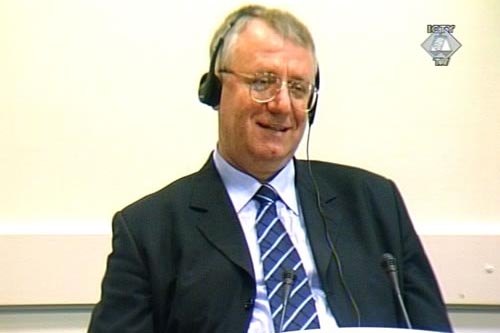Home
PROSECUTION OPPOSES PROVISIONAL RELEASE OF VOJISLAV SESELJ
If Seselj were to be provisionally released pending trial, the prosecution claims, he would pose a threat to victims and witnesses and would have motive to refuse to return to The Hague
 Vojislav Seselj in the courtroom
Vojislav Seselj in the courtroom The prosecution is categorically opposed to the motion filed by Vojislav Seselj for his provisional release from the UN Detention Unit, pending trial.
In a motion filed last month by Seselj's legal counsel, it is noted that the accused "appeared in The Hague voluntarily" and that "there is not even a theoretical possibility" that he might pose a threat to victims and witnesses while at large since "there is not a single victim that the accused could be held responsible for, directly or indirectly or on the basis of any insinuations." It is also stated that Seselj has been in detention for 15 months and that the trial is not likely to start before 2007, since the prosecution, in the opinion of the legal counsel, is not able to find evidence to substantiate its "unfounded accusations."
A lengthy prosecution response made public at the Tribunal today challenges all the arguments presented by Seselj's legal counsel. According to the prosecution, Seselj's voluntary surrender was the result of the fact that his arrest and surrender to The Hague were practically inevitable after the publication of the indictment against him, as the accused admitted himself.
In the view of the prosecution, the judges should give special weight to the fact that only after he had surrendered the accused was given the opportunity to acquaint himself with the volume and seriousness of the evidence against him. In light of the gravity of the offences he is charged with and the possibility of a lengthy prison sentence if he is found guilty, the accused might have a motive to refuse to return to The Hague for his trial, it is argued. The prosecution also notes that the government of Serbia-Montenegro has not given any guarantees that it would arrest and forcibly transfer Seselj to The Hague if he refused to return there voluntarily. Even if the accused offered such guarantees, the prosecution considers that they should be given scant weight, in light of the current degree of cooperation of Belgrade with the Tribunal.
Contrary to the claims made by Seselj's legal counsel that “there is not a single victim that the accused could be held responsible for", the accused has been given in the course of the disclosure process "statements of numerous victims who are ready to testify against him", the prosecution said. They might be under threat if he were to be released. In the opinion of the prosecution, Seselj is "willing and able" to intimidate and threaten prospective prosecution witnesses; he has already done so with some witnesses testifying in the Slobodan Milosevic trial. Seselj's disclosure of a confidential statement given by Nenad Canak to the investigator and his public attacks on General Aleksandar Vasiljevic whom he labeled a "false witness" are cited as examples.
Finally, the response states that any delays in the preparations for the trial are the result of Seselj's obstructions, not of any errors on the part of the prosecution. In the prosecution's view, Seselj's "frivolous, adusive, belated and voluminous motions" burden the translation service of the Tribunal, the prosecution which is compelled to file responses and the judges, who must rule on them. Furthermore, the prosecution notes, the accused persistently "wastes the Tribunal's time" with his insulting accusations and slander he presents at status conferences.
The Chamber has yet to set a date for the hearing on Vojislav Seselj's motion for provisional release.
Linked Reports
- Case : Seselj
- 2004-07-02 PROSECUTION APPEALS THE VOJVODINA JURISDICTION DECISION
- 2004-06-30 SESELJ SEEKS PROVISIONAL RELEASE
- 2004-06-14 JUDGE PROTECTS SESELJ FROM HIMSELF
- 2004-09-06 VOJVODINA TO REMAIN IN SESELJ INDICTMENT
- 2004-10-04 ON PAPER AND IN SERBIAN, PLEASE
- 2004-11-04 APPLICATION FOR AMENDMENT OF INDICTMENT AGAINST SESELJ
